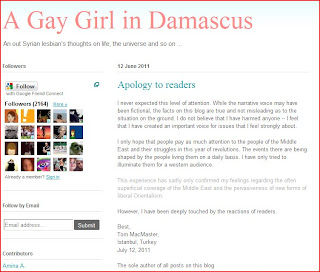
The furore over the A Gay Girl in Damascus blog hoax should not distract attention from the plight of real bloggers and online journalists in the Middle East, according to the Committe to Protect Journalists' Danny O’Brien.
O’Brien, the CPJ's internet advocacy coordinator, says he was in Beirut talking to real Syrians about the detentions of online journalists, some of whom had befriended Amina (the supposed writer of A Gay Girl) online, and they were profoundly disturbed that she was a fraud.
He writes on the CPJ site: "Beyond the time-sink of watching the Net collectively pursue a story, the undermining of important ties that can help protect vulnerable writers in times of danger, and the sympathetic anger and hurt of many at being betrayed, the Amina hoax continues to be a distraction. It has drawn attention away from genuine cases of imprisoned bloggers and online journalists in the region.
"Amina's story--her original blog and her subsequent revelations--shouldn't cloud the real cases of bloggers and journalists in Syria and the wider region who face genuine danger.
"For instance, Tal al-Mallohi was sentenced in February to five years in prison for violating Syria's state security laws. The court proceedings remain secret but she was prosecuted, her supporters say, because of postings on her blog. To make matters worse, she was only 19 when she was first arrested, making her the youngest human rights case in the region. The campaign to free al-Mallohi has a website and Facebook group. The U.S. State Department has also protested the prosecution.
"Elsewhere, in the United Arab Emirates, five bloggers and commentators accused of undermining public order went on trial. As we reported at the time of their arrest, the UAE bloggers include the administrators of a banned forum. That forum, CPJ research shows, is one focused on politics, pluralism and democracy. While the UAE plans to hold the trial in secret in order to, in the words of the official state media, "ensure no pressure is exercised on the court," diplomatic pressure from the UAE's allies--encouraged by individuals raising the issue with their representatives--could make a difference.
O'Brien concludes: "Legitimate writers in the region risk their freedom and safety every day to simply comment on what they see around them. This is difficult and dangerous enough without them having to contend with the pathologies of liars inserting themselves into that discussion."




No comments:
Post a Comment